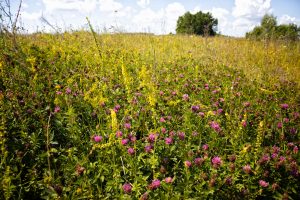Organic farming provides honeybees critical food sources in agricultural regions
 Photo Credit: Vadim Karnakhin
Photo Credit: Vadim Karnakhin
A study recently published in the Journal of Applied Ecology found that organic agriculture can significantly increase the health of honeybee hives by providing continuous food sources when flowers are scarce in the landscape. Intensive and conventional farming are known to decrease important biodiversity such as pollinators and natural enemies to pests by removing vegetation that would otherwise provide food and nesting resources, and by using pesticide sprays that harm beneficial insects as well. This study found that when there is a larger proportion of organic agriculture at a landscape scale, the productivity of worker honeybees increases and the number of adult bees in the hives increases because organic farms have more flowering weeds and diversified crops that provide a continuous, healthy diet for honeybees. Pesticide drift is also reduced with more organic farms in the landscape, which reduces bee die-offs. This study adds to the growing body of scientific literature that shows organic farming supports biodiversity and pollinator health.


